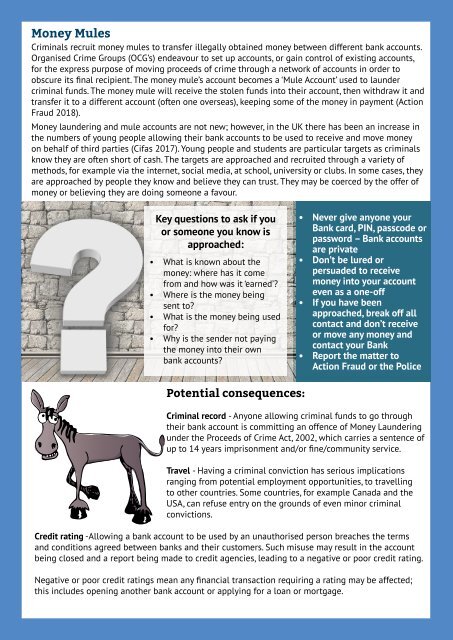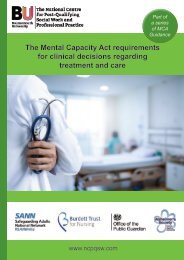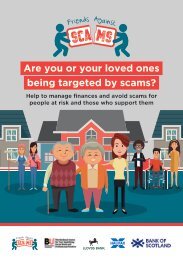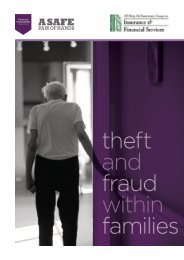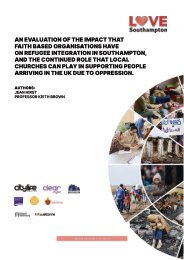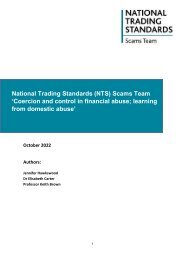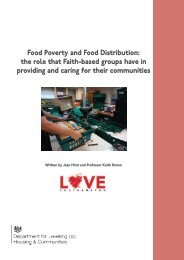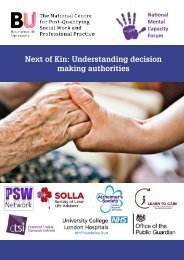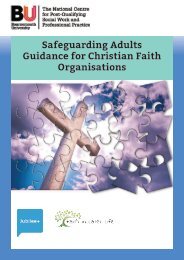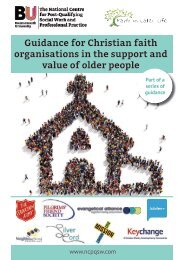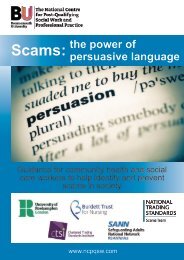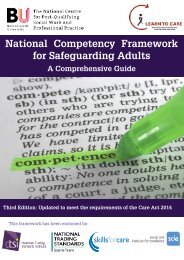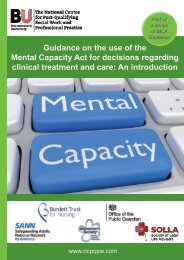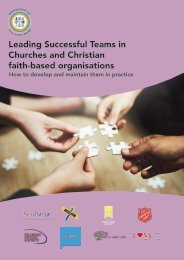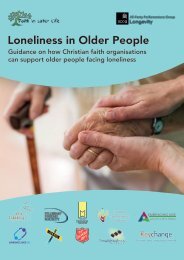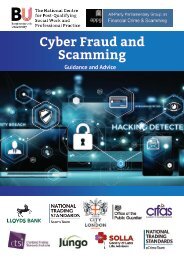Financial Scamming and Fraud
Financial scamming and its impact have been receiving a higher public profile in recent months, yet though it is recognised as a growing problem, there is a lack of clear research and evidence into the scale of the problem, its causes and the impact on the public.
Financial scamming and its impact have been receiving a higher
public profile in recent months, yet though it is recognised as a
growing problem, there is a lack of clear research and evidence
into the scale of the problem, its causes and the impact on the
public.
You also want an ePaper? Increase the reach of your titles
YUMPU automatically turns print PDFs into web optimized ePapers that Google loves.
Money Mules<br />
Criminals recruit money mules to transfer illegally obtained money between different bank accounts.<br />
Organised Crime Groups (OCG’s) endeavour to set up accounts, or gain control of existing accounts,<br />
for the express purpose of moving proceeds of crime through a network of accounts in order to<br />
obscure its final recipient. The money mule’s account becomes a ‘Mule Account’ used to launder<br />
criminal funds. The money mule will receive the stolen funds into their account, then withdraw it <strong>and</strong><br />
transfer it to a different account (often one overseas), keeping some of the money in payment (Action<br />
<strong>Fraud</strong> 2018).<br />
Money laundering <strong>and</strong> mule accounts are not new; however, in the UK there has been an increase in<br />
the numbers of young people allowing their bank accounts to be used to receive <strong>and</strong> move money<br />
on behalf of third parties (Cifas 2017). Young people <strong>and</strong> students are particular targets as criminals<br />
know they are often short of cash. The targets are approached <strong>and</strong> recruited through a variety of<br />
methods, for example via the internet, social media, at school, university or clubs. In some cases, they<br />
are approached by people they know <strong>and</strong> believe they can trust. They may be coerced by the offer of<br />
money or believing they are doing someone a favour.<br />
Key questions to ask if you<br />
or someone you know is<br />
approached:<br />
• What is known about the<br />
money: where has it come<br />
from <strong>and</strong> how was it ‘earned’?<br />
• Where is the money being<br />
sent to?<br />
• What is the money being used<br />
for?<br />
• Why is the sender not paying<br />
the money into their own<br />
bank accounts?<br />
• Never give anyone your<br />
Bank card, PIN, passcode or<br />
password – Bank accounts<br />
are private<br />
• Don’t be lured or<br />
persuaded to receive<br />
money into your account<br />
even as a one-off<br />
• If you have been<br />
approached, break off all<br />
contact <strong>and</strong> don’t receive<br />
or move any money <strong>and</strong><br />
contact your Bank<br />
• Report the matter to<br />
Action <strong>Fraud</strong> or the Police<br />
Potential consequences:<br />
Criminal record - Anyone allowing criminal funds to go through<br />
their bank account is committing an offence of Money Laundering<br />
under the Proceeds of Crime Act, 2002, which carries a sentence of<br />
up to 14 years imprisonment <strong>and</strong>/or fine/community service.<br />
Travel - Having a criminal conviction has serious implications<br />
ranging from potential employment opportunities, to travelling<br />
to other countries. Some countries, for example Canada <strong>and</strong> the<br />
USA, can refuse entry on the grounds of even minor criminal<br />
convictions.<br />
Credit rating -Allowing a bank account to be used by an unauthorised person breaches the terms<br />
<strong>and</strong> conditions agreed between banks <strong>and</strong> their customers. Such misuse may result in the account<br />
being closed <strong>and</strong> a report being made to credit agencies, leading to a negative or poor credit rating.<br />
Negative or poor credit ratings mean any financial transaction requiring a rating may be affected;<br />
this includes opening another bank account or applying for a loan or mortgage.


